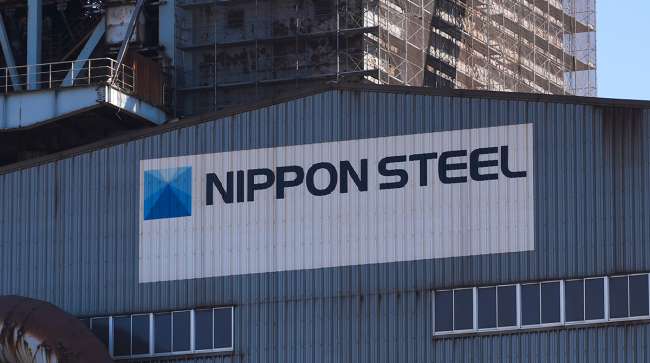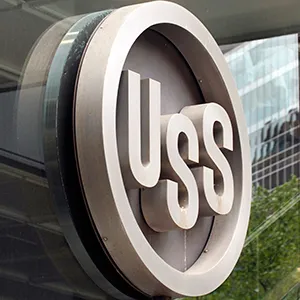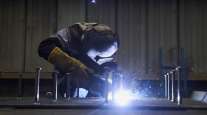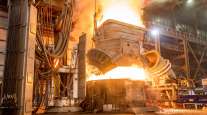Associated Press
Nippon Steel Eyes Overseas Market in Bid for US Steel

[Stay on top of transportation news: Get TTNews in your inbox.]
KASHIMA, Japan — The signs at Nippon Steel read: “The world through steel,” underlining why Japan’s top steelmaker is pursuing its $15 billion bid to acquire U.S. Steel.
“We can’t expect demand in Japan to grow as the population is declining. We need to invest in production that leads to growth,” a company official, Masato Suzuki, said Dec. 6 while giving reporters a look at a Nippon Steel plant in Ibaraki prefecture, north of Tokyo.
Nippon Steel Corp. has its eyes on India, Southeast Asia and the U.S., Suzuki said. About 70% of the plant’s output is exported.
The Tokyo-based company remains optimistic, although the deal is opposed by President-elect Donald Trump, President Joe Biden and American steelworkers.

The United States Steel logo outside the headquarters building in downtown Pittsburgh. (Gene J. Puskar/AP/file)
During the tour, slabs of steel, glowing hot-orange at more than 1,800 degrees Fahrenheit, rolled through the cavernous plant to become giant spools of super-thin steel.
Nippon Steel officials didn’t disclose details of the fine technology they said the planned acquisition would offer U.S. Steel.
Under the proposed deal, first announced in 2023, U.S. Steel would keep its name and its headquarters in Pittsburgh, becoming a subsidiary of Nippon Steel.
Nippon Steel already has manufacturing operations in the U.S. and Mexico, China and Southeast Asia. It supplies the world’s top automakers, including Toyota Motor Corp., and makes steel for railways, pipes, appliances and skyscrapers.
The American steel industry has waned as Chinese steelmakers have grown to dominate the market. Japan wants to leverage the decades-old U.S.-Japan security and political alliance to seal the acquisition, but the outlook is uncertain.
In September, an arbitration board jointly chosen by U.S. Steel and United Steelworkers decided the proposed acquisition could proceed.
But United Steelworkers union, which has 1.2 million members, have objected, citing worries about job losses and contract terms.
Lori Heino-Royer of Waabi discusses the latest developments, breakthroughs and key industry partnerships in autonomous trucking. Tune in above or by going to RoadSigns.ttnews.com.
The union has questioned Nippon Steel’s plans to transfer production locations and concerns about national security and domestic supply chains.
When asked for comment, it referred to a recent letter to its members.
“As a union, our primary concern is the future of our jobs and the communities we live and work in — not just this year, but also for the foreseeable future. We’ve seen job losses in the past, and we must do everything we can to avoid it in the future,” said the letter, co-signed by Mike Millsap, chairman of the negotiating committee, and its international president, David McCall.
“While Japan is a political ally, it is also an economic competitor, one that has proven time and again that it is willing to promote its steel industry at our expense,” the union said.
Nippon Steel is promising to “preserve the legacy” of U.S. Steel and protect jobs, pensions and benefits, pledging that there will be no layoffs or plant closures.
The deal is expected to produce an economic boost for the region equivalent to nearly $1 billion in the first two years, create up to 5,000 construction jobs and generate almost $40 million in state and local taxes, according to Nippon Steel.
Want more news? Listen to today's daily briefing above or go here for more info
William W. Grimes, professor of international relations and political science at Boston University, said Nippon Steel’s commitment to keeping the U.S. Steel factories running would help preserve U.S.-based production of specialty steels. Nippon Steel also has also promised investments to make the factories more competitive.
There is no militarily sensitive technology Nippon Steel would be able to take from the U.S., and the U.S. relies on steel produced in allied countries, including Japan, Grimes said.
“If Japanese companies do draw a lesson, it should be to engage unions and local politicians early in the process,” he said.





